Answer these simple questions and we will find you the BEST prices
Which type of solar quotes do you need?
It only takes 30 seconds
100% free with no obligation

Get Free quotes from insulation specialists near you

Save money by comparing quotes and choosing the most competitive offer

The service is 100% free and with no obligation
- GreenMatch
- Insulation
- Wall Insulation
- Cavity Wall Insulation
- Cavity Wall Insulation Check
How to Check Cavity Wall Insulation: Guide & Tips

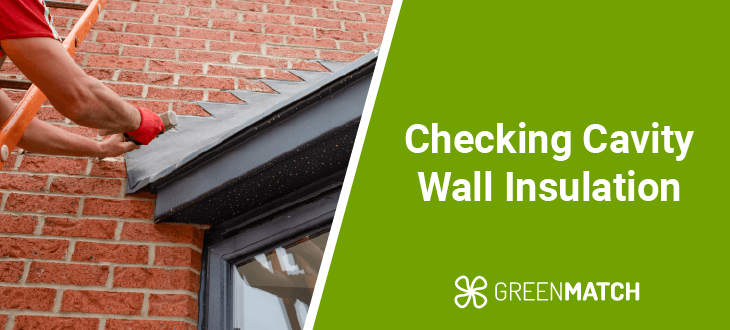
- Cavity wall insulation can save up to £405 on energy bills for a detached UK home.
- There are simple ways to monitor your cavity wall insulation health, helping you avoid problems from arising proactively.
- Properly installed cavity wall insulation is expected to last up to 25 years or more.
Cavity walls are one of the most popular build types across the UK, totalling around three-quarters of all properties. These wall types consist of an inner and outer leaf, with a cavity space in between that can be filled with insulation material.
This highly effective method can cut your home’s heat loss by up to 33%, bringing you massive energy bill savings, CO2 cuts, and fostering a cosy home environment. However, you might ask yourself; how do I know if I have cavity wall insulation?
This ultimate guide by GreenMatch UK will show you how to identify cavity wall insulation, how to monitor its health and notice telltale signs of damage before they become a bigger issue.
Want to insulate your cavity walls? GreenMatch UK can be your one-stop solution! Instead of spending endless hours scouring the web for the right bargain, just spend 30 seconds filling out our survey and we’ll send you up to 3 free home-tailored quotes from trustworthy installers in your area. Completely free of charges and obligations. Click below to begin!
- Describe your needs
- Get free quotes
- Choose the best offer
It only takes 30 seconds



How do you know if you have cavity wall insulation?
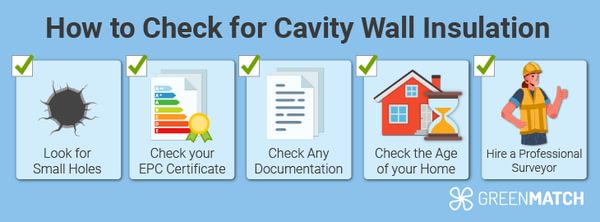
The easiest way to know if you have cavity wall insulation is to check your brickwork for drill holes. Wall cavity insulation is installed by drilling small, evenly spaced holes through the outer wall and injecting insulation material into the cavity space. After installation, these small holes are filled with cement to prevent moisture from entering, but can sometimes still be visible.
In some cases, these small holes might not exist. If you live in a newly built home, or if an installer did a really good job in concealing the marks on your outer wall, checking for drill patterns might not be feasible.
Luckily, there are a few other ways to check whether your cavity walls already contain insulation:
- Check your EPC certificate: Every home has an EPC certificate detailing its energy efficiency. Check your EPC documentation at home, or online through the UK government's EPC register for more information.
- Check any documentation: Property documents normally mention home details, energy efficiency upgrades, and any warranties that may be in place.
- Check the age of your home: Homes built after the 1930s usually have cavity wall insulation in place due to building regulations since then.
- Hire a professional surveyor: You can hire a professional to conduct a cavity wall insulation check using a borescope camera to check for insulation. This can cost around £150 - £300.
If you know that you do not have cavity walls, you can check some alternatives to cavity wall insulation that are more suited for your home.
Look for small holes
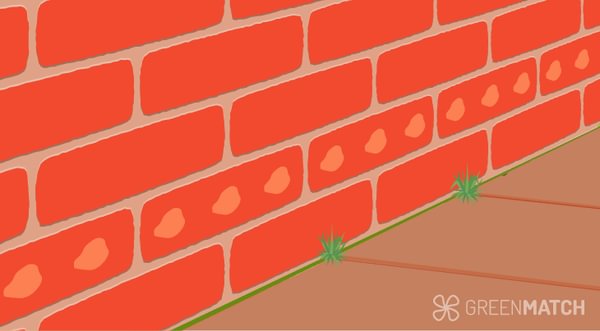
Identifying small holes that are evenly spaced along the mortar lines of your exterior brickwork is a telltale sign of cavity wall insulation. These holes will likely already be filled in with cement, but you may still notice their outlines.
These evenly spaced drill holes in your cavity walls also give you a clue as to what type of insulation material you’re likely to have. In this case, your walls likely contain polystyrene bead insulation or blown mineral wool insulation.
Check any documentation
There are two key documents you can check to get information on your home and its energy efficiency upgrades: your EPC certificate, or your home documentation.
An Energy Performance Certificate (EPC) tells you of your home’s energy efficiency, more specifically how much energy it consumes to live in your home. Properties are graded from A (most efficient) to G (least efficient).
Every home comes with an EPC, which can also have a record of home efficiency upgrades that have taken place. You can check your EPC documentation for information on cavity wall insulation, or check online through the UK official EPC register by using your address.
Property documents can mention energy efficiency upgrades that have taken place, especially if installed by a registered installer. Most professional cavity wall insulation companies are CIGA certified, coming with a 25-year guarantee on jobs. Property paperwork likely contains details of this guarantee if insulated.
Check the age of your home
If your home was built after the 1930s, you're likely living in a cavity wall property. If you’re unsure, you can identify cavity walls by simply looking at your brickwork pattern.
Cavity wall properties always have an even brick pattern, where all the bricks are laid lengthways. In comparison, solid wall properties have uneven brickwork patterns.
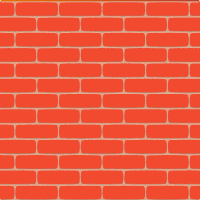
If your home was built after the 1990s, there's a big chance it has cavity wall insulation in place. This is because property regulations began demanding cavity wall insulation for all cavity wall properties around this time.
This doesn’t mean that any cavity wall insulation hasn't been removed or replaced since then but does increase the likelihood that your cavity walls have insulation in place.
Hire a professional surveyor
If you’re still wondering how to check for cavity wall insulation, you can always hire a professional surveyor to conduct a wall inspection.
Surveyors and installers use a handy tool called a borescope. This is a cavity wall insulation checker that uses a camera on an extendable beam to check cavity wall insulation through a drilled hole. It can also identify if any insulation in place is in good shape or not.
A cavity wall inspection can cost anywhere from £150 - £300, but some insulation companies provide free inspections with their cavity wall insulation packages.
How to check if your cavity wall insulation is in good condition
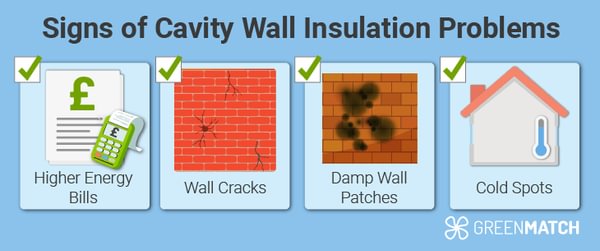
Now that you know how to check cavity wall insulation, how can you make sure it works? You may find that your home already has cavity wall insulation in place, but this doesn’t always mean it’s performing as it should. Cavity wall insulation can still be damaged, or even subject to moisture and mould growth.
There are several telltale signs you can look out for to know whether this might be the case:
- Higher energy bills: If you’ve noticed your energy bills rising suspiciously, or if they were too high to begin with, perhaps your cavity wall insulation is not working as effectively as it should in retaining heat.
- Wall cracks: Your outer brick wall is the barrier keeping your insulation material dry and functional. If you notice cracks, gaps, and openings in your brick walls, your insulation might be exposed to moisture and clumping. These gaps need to be sealed.
- Damp wall patches: Cavity wall insulation damp and patches on inner walls indicate that moisture has leaked from your outer wall and through the insulation material, reaching the inner walls of your home. You may also notice mould growth, or an earthy odour in your home that indicates a moisture increase.
- Cold spots: If some spots in your home feel a little colder than others, then it’s worth checking your walls. You might notice cold spots on your walls where insulation is weak or clumping, leaving sections of your cavity space empty and uninsulated.
If you notice any of these signs, contact a professional installer for a wall inspection. Handling these problems proactively can help you avoid burdensome repair costs and structural home issues down the line.
Find cavity wall insulation professionals near you
Deciding to insulate your cavity walls is just the first step! To avoid a burdensome cavity wall insulation price, choosing the right professional installer is just as important, as this could be the line between decades of comfort and a poor installation with hefty repair bills.
When looking for installers, make sure to check for these key points:
- Certifications: The Cavity Insulation Guarantee Agency (CIGA) is an independent body that provides guarantees for insulation defects and poor installer workmanship. A job by a CIGA-guaranteed installer comes with a guarantee of up to 25 years, ensuring that your investment is protected.
- Reviews: By checking reputable sources like TrustPilot and TrustMark, you can learn all about an installer's reputation amongst previous customers. You can even reach out to previous customers to learn about their experiences firsthand.
- Get multiple quotes: Don’t just settle on the first price you get. There’s an abundance of installers on the market, each with its unique selling points. To land the best bargain for your home, make sure to research and vet a wide range of installers.
While it all seems straightforward, researching and vetting installers can take endless hours with no bargain in sight. That’s where GreenMatch UK can save you the effort.
Instead of spending countless hours scouring the web and scheduling phone calls with potential installers, just spend 30 seconds filling out our simple form. In return, we’ll send you up to 3 free home-tailored quotes from trusted installers in our nationwide network at competitive prices. The best part? Our services are completely free and without obligations. Click below to begin!
- Describe your needs
- Get free quotes
- Choose the best offer
It only takes 30 seconds



FAQ
Only houses with cavity walls have cavity wall insulation. These walls, common after the 1930s, are made of an inner and outer leaf, with a cavity space in between. You can usually identify cavity walls by their evenly spaced and horizontal brickwork.
If you’re wondering how to tell if you have cavity wall insulation, there are a few telltale signs you can look for. The simplest way is to check your brickwork for drill holes. If you notice small, evenly spaced holes that have been filled in, this is a sign that cavity wall insulation is installed.
Cavity wall homes after the 1990s are also highly likely to have insulation in place due to building regulations that have demanded it since.
You can also check if you have cavity wall insulation from your EPC certificate, or house documentation, or by hiring a professional surveyor to inspect your walls.
If properly installed, cavity wall insulation can last 25 years or more. This depends on the condition of your cavity walls.

Akif is a copywriter at GreenMatch since 2023. With a keen interest in community sustainability, green solutions and the role of digital media in identifying climate trends, he aims to hone in on his background in International Studies and Digital Media to provide a multidisciplinary approach to written content rooted in credible research and accuracy.
We strive to connect our customers with the right product and supplier. Would you like to be part of GreenMatch?

